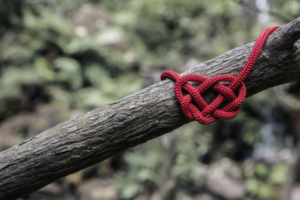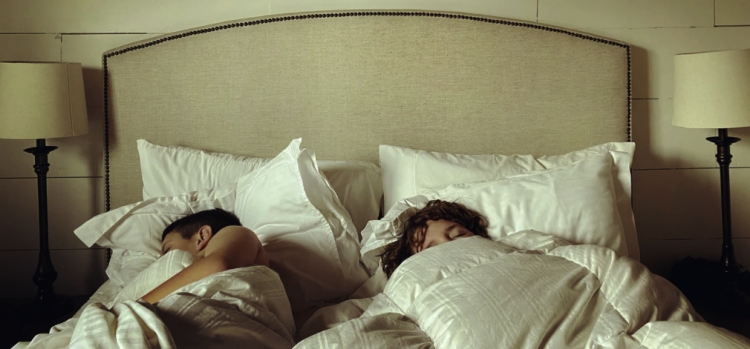He was pale. Wrapped in a stark white blanket, cold and blind. The mother lay, one leg uncovered on top of the sheet, sweat dried along her forehead, resting from some sixteen hours. The child un-held. There was a father, outside in the desert cold, smoking. A witness to what seemed like everything. The child opened his eyes, the room dark, distorted in shadow. A glow flickered from behind a row of palm trees and through the crack of the teal and dinged curtains, warming his face. He closed his eyes and opened them to that light. A day, a life, some accident brought by the turning of the universe and all of us happenstance. See the figures dance along the plaster. Hear the raven, out in a world unknown and the life of a moment, spread across all moments and it is now or then, whispering softly to what is nothing, offering all of time and the universe to he, alone, always, while the mother sleeps and the father smokes and always, through a moment, spread across all moments.
* * *

When he turned seven, his father led him to a maple tree in the backyard, the grass still a light brown, the tree without leaves, and showed him a red climbing rope. It swayed in the breeze. Eli took it in his hands and began to climb. His father smoked. Eli watched as the smoke rose and bent around the lower limbs, becoming lost somewhere. He reached the top of the rope and came back down, his father patting him on the back and he went in and saw the mother there with a cake.
“Sit, you have to blow out your candles,” she said.
His brother, Adam, was already sitting and, as he came through the door, he closed it and opened it again and closed it. “What was that?” Asked the mother.
“I don’t know. Didn’t feel right.”
“What do you mean?”
“I have these things I do, like counting and stuff.” He sat, looking down.
“That’s the devil telling you to do stuff. Pray about it tonight.”
“Okay.”
That night he prayed and went to turn off his light and turned it back on and off and did it four times. He heard his mother coming down the hall and turned the light off a long time, feeling wrong about it. A sensation to restart the compulsion, but he did not and waited for the mother to come.
“Did you do it again?” She asked.
“What?”
“The counting thing.”
“Yeah, with the light.”
“You keep doing these things. You need to stop.”
“I can’t.”
“Or what? What will happen?” She came more into the room.
“Stuff.”
“What kind of stuff?”
“Like dad will die. Or I’ll throw up, things like that.”
“What?”
“I don’t know, I know it’s dumb, but I can’t stop.”
“Elijah, you can’t do these things. Nothing will happen. God will protect you.” She turned on the light. “You sound like a crazy person.”
“I know, but I can’t stop.”
“You listen to me, either you stop, or you’re getting a busting.”
“That’s not fair.” He went to his bed and crawled in, pulling the blanket over his head. The heat from his breath already making him uncomfortable.
“Excuse me?”
“I can’t stop. I’m sorry.” He began to cry, the tears warm against his face. The sound muffled through the blanket.
“Stop crying, you sound like a girl.” She turned off the light and went out, slamming the door. That night he heard the parents arguing. He went back under the blanket, placing his fingers in his ears and closed his eyes. Adam came in.
“They’re fighting again,” said Adam.
“I know, it’s okay.” He patted the bed next to him and Adam climbed up. He laid next to Eli and fell asleep. Eli watched him, the shallow breaths he took and heard a loud bang from the parent’s room and closed his eyes. He brought Adam closer, holding him tighter, and fell asleep.

Months on and he had found ways of hiding the compulsions from her. Chewing in fours, counting his steps, swallowing while looking away. They sat eating spaghetti.
“Why do you keep looking up like that?” asked the mother.
He felt his muscles tighten. His eyes opened wider.
“I don’t know.”
“Is it those wild compulsions again?”
“No.”
“Are you lying?” she said, setting her fork down, staring at him.
“No.”
“I will not have lying in my house.”
“I’m not, I promise.” Adam asked to be excused and went off somewhere and Elijah sat at the table with his mother, the father outside smoking. She grabbed his arm and squeezed. “I will not allow lying. Do you understand?”
“Yes, I’m sorry.” He wanted to cry.
“Now, tell me, is it something telling you to look away like that?”
He thought for some time, looking at his food. “Yes.”
“So you did lie.” She stood. “Up, now, get up.”
“Please, no. I’m sorry. I didn’t want you to worry.”
“If I have to get you out of that chair, it’s going to be worse.”
He stood and pushed his chair in and felt the first of many slaps and he cried. “Stop crying.” She was out of breath when she had finished and sat down and began eating again. “May I go to the bathroom?” He asked. He could taste blood.
“No, you sit and finish your dinner.”
“Adam didn’t have to.”
“Your brother is a good boy.”
They ate in silence. The mother’s teeth clinking against her fork now and again and he twirled the spaghetti and nibbled at it, hiding the compulsion to look away, still counting in fours as he chewed.
Sometime later he found himself with the rope in his hands, untied from the tree. His face red and wet from crying. He brought the rope over to the porch. It was unusually cold. He shivered some and after he tied the knot, he stepped atop the chair under the pergola and cinched the rope around his neck; the fibers rough, eating into his skin. He looked out over the yard and saw his brother playing in the dirt. He witnessed the clouds break and beams of light come down and paint the distant hills and the fields beyond them a light, misty gold and he thought of his life, the few years, the hours and how they had followed him to this moment. Time and wait and now, he could see the birds glide among the blueness of the sky and hear the sound of Adam digging and nothingness, only himself, floating within the timelessness and he rocked some on the chair then struggling, a certain resilience and freedom and then on the ground, surrounded by his family, the father undoing the rope.
“Why would you do that? ” his mother asked.
Years on and he finds himself at his parents, visiting, looking out over their yard and watching as the red rope dangled and moved with the wind. He recalled climbing it when he was younger. How, from the top of the rope, he saw a small starling nest fashioned from twigs and bits of trash, eggs in it. How he could hear the starlings call, quick, dulcet and, as they swooped down and glided along the tips of the hickory, he would rest atop a branch and take in the sounds and the breeze and go down and off and played somewhere else, hearing the birds, the rope there, swaying.
“What’re you doing?” asked the mother.
“Nothing.”
“Everything alright?” She took up some plates and began setting the table.
“Why’d we bring that rope with us?”
“What rope?”
“The red one, there, in the tree,” he said, pointing.
“Why wouldn’t we? Your father got it for you.”
“I don’t know, because what I did with it.”
“Oh, no. That was just an accident.”
He sat at the table. She continued setting silverware and napkins down and went about adjusting the temperature on the stove.
“I think I’m gonna head out,” he said.
“What? You’re not staying for dinner,” she said, taking a pot from the stove and pouring its contents in a bowl.
“I’ll be back soon.”
“Okay.” She said as he began down the stairs. “Oh, Eli, tell your father bye.”
He went on and found his father outside, watering the flowers. Eli went over to him and rubbed his back. His father turned and stopped the water. “How are we?” The father said.
“Think I’m going home.”
“Already?”
“Yeah.”
“You could at least stay for dinner. I know your mother made extra.”
“I’ll come back by soon.”
“Alright, love you.”

Eli drove some ways and turned back and parked down the street and went to the tree. The rope there, rotting, moss growing along it, and he reached up and undid the knot and rolled it and took it with him. When he got home, he took the rope, the fibers scratching his hand, some falling off, and slung it over the curtain rod and fixed it there. He looked out through the window and saw nothing save a train, its engine ticking, and he saw the conductor there, alone. Eli waved, but the man did not wave back. He turned from the window and laid on the couch, staring at the rope, pendulant and still. He stood and went to it – The world now dark outside the window and the rope and himself illuminated by the orange glow of the single lamp in the loft. He rested on the sill next to the rope, then climbed up and began fastening it around himself, seeing another train come to a stop outside and could not see the man in it, but knew there was one, and undid himself, closing the curtains and went to the couch again and cried. Alone and in that dark of the loft, Eli rested his face within his hands and witnessed the hours, the days before him, and knew there to be so many and too few and felt his life leaving and now, assuredly and resolute, went to the window and opened the curtains again, staring at the rope – Crying harder now, staring at the thing there, he grabbed it and screamed a vacuous and desperate scream and pulled on it. The curtain rod came down and the rope in his hand fell and he backed away from it all and knelt on the floor, resting his back against the wall, crying until he slept.
He woke to his alarm. A moment of tranquility. Warmth in the clothes from the day before. Serenity and comfort. He laid on the hardwood longer, hearing the alarm. Realization and discomfort fell over him. He rose and showered using gloves, dressed and went out into the new day. At work he thought of the rope and a better place to hang it. This was his third job in as many years and he took his medication and sat, waiting for the panic to fade, but it did not and he fidgeted in his seat – Waves of nausea and anxiety. There were birds nesting in the window that looked out over the city and he watched them. He thought of a different way, seeing those birds shiver in the early spring morning. He stood and walked through the people whose names he did not know yet and opened the door to the parking lot, the sun hitting him through the breaking storm clouds. Eli lit a cigarette as he walked toward his car, rested against it and took a drag, then tossed the butt and got in. He sat there, seeing a large grouping of birds fly over, blocking out the light for a moment. He started the car and went home. The loft was stagnant. Silent. There was the smell of old dishes. The heat turned on with a mechanical whine. Light crept in through the blinds and illuminated the stirred dust as it floated down. He went to the rope and undid it from the broken curtain rod, approached the bathroom door and fastened it to the knob, then stepped back, staring at it longer. How the hours have come to now. Spring and lilacs, the birds dance in nothingness and the darkness of the place he finds himself, a witness there, alone and restive, the rope hanging against the silver of the knob, godlessness and only among it all and nothing, to that moment, spread across all moments. It could have been minutes or hours, but he found himself on the couch once more, groggy and crying, and woke to sunlight warming his face, the dried tears salty at the corners of his mouth. Option-less and already mourning, thought and forlornness within that world, he walked to the rope, opening the bathroom door and went in – Looking in the mirror, into his own eyes, knowing himself, deeply and assuredly, he turned and undid the rope and drove on toward his parents. When he arrived, he went in and left the rope in the car.
“Hey,” said the father.
“Hey, when’s dinner?”
“Now, I think. Go ask your mom.”
He went into the kitchen, the old floor creaked with his steps. The cabinets were dark and stood in stark contrast to the burnt orange walls. Eli saw his mother at the stove. Her night gown dragging along the floor and she swayed to a pop remake of an old hymn he thought he might have heard before. “When’s dinner?”
“Oh, you’re staying this time?”
Eli stared at the back of her head and went over and sat at the table.
“In a sec,” she said. “Help me set the table.”
He did and they all sat and ate. “So why were you asking about that rope the other day?” Asked the mother.
“No reason.”
“I noticed it was gone. You take it?”
“I…”
“Your father got that for you. You should bring it back. It’s safe here.”
“And it’s not safe at my place? Why did we even bring it here with us?”
“What’s the issue with the rope?” Asked his father, walking in.
“You don’t remember?” asked Eli.
“Remember what?”
“Nothing.”
“It was an accident and you know it. Why are you always like this?” asked the mother.
“Like what?”
“Acting depressed. You were never like this when you were younger. You used to be so happy. Now you’re…”
“What? What am I?”
“Nothing.”
“No, what?”
“You’re a chore to be around.”
“Honey,” said the father.
“No, he needs to hear this. You’re never happy. All you do is mope. You need to get over it.”
She went on, but he ate and did not listen. As she stood, he helped her with the dishes in silence, putting on gloves, hearing her speak, but only nodding. He washed his hands four times after finishing the dishes and sanitized with a little bottle in his pocket. “Still doing all that I see,” she said.
“Been doing it all my life.”
“You know you don’t have to.”
“Yeah mom, I know.”
“It’s just the devil telling you to.”
“Got it mom. I’ll pray harder then.”
“Good boy. I’m sure your brother’s up there listening to your prayers.”
“Yeah, bet he is.” He shook his head, counting in fours while turning the kitchen light off.
His parents went to the living room to watch television and he went out back to his car and grabbed the rope. He went to the hickory and strung it up. He sat in the yard beneath it and cried, picking blades of grass and squeezing them between his fingers, gritting his teeth, and wailed within himself. He stood and grabbed the rope and pulled on it, looking up at the branch, and rested some on it, then began to climb. The rope creaked under his weight as he climbed on, past the last knot and further into the tree. As he came to the top, he saw the small leaves coming alive among the branches and watched as the sun set. He smelled the honeydew along the fence and heard the starlings as one drifted along the purple and blue of the sky. He could hear more somewhere in the trees and stayed there longer and to take it in, feeling something he had not felt before and knew himself differently in that moment, accepting it, and stayed there until he opened his eyes to the last light.

Ryan McGill is an emerging writer in Knoxville, Tennessee who has dedicated his life and efforts to crafting an original and engaging writing style.
** Featured Image Source: pxfuel.com
